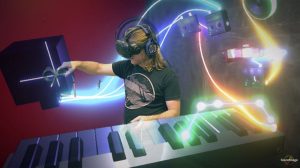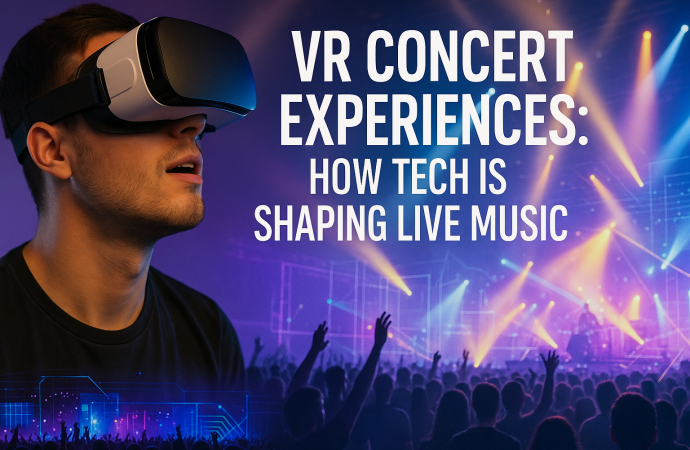Introduction In 2025, the way we experience live music is undergoing a significant transformation thanks to the rise of virtual reality (VR). For decades, concertgoers have enjoyed the magic of live music in packed venues, feeling the energy of the crowd and the thrill of seeing their favorite artists perform. However, with the advancement of
Introduction
In 2025, the way we experience live music is undergoing a significant transformation thanks to the rise of virtual reality (VR). For decades, concertgoers have enjoyed the magic of live music in packed venues, feeling the energy of the crowd and the thrill of seeing their favorite artists perform. However, with the advancement of VR technology, the live music experience is no longer limited by physical location or capacity. Now, VR is shaping the future of music, enabling fans to enjoy immersive concerts from the comfort of their own homes.
The combination of VR technology and live music has created a new world of possibilities for both artists and audiences. In this article, we’ll explore how VR concert experiences are reshaping the music industry, the benefits of these virtual performances, and how they are set to evolve in the coming years.
What Are VR Concerts?

Image by: Yandex.com
A VR concert is a live performance that uses virtual reality technology to immerse viewers in a 360-degree environment, allowing them to experience the concert from a variety of perspectives, as though they were physically present at the event. With the help of VR headsets, concertgoers can experience the performance as if they were standing in the front row, even if they are thousands of miles away from the venue.
Unlike traditional live streams or recorded concerts, VR concerts provide an interactive and immersive experience. Fans can choose their vantage point, look around the venue, and even interact with other attendees in virtual spaces, all in real-time.
How VR Technology is Transforming Live Music

Image by: Yandex.com
VR concerts are still a relatively new concept, but they have already made a significant impact on the live music industry. Let’s take a look at how VR is reshaping the music experience for both artists and fans.
1. Breaking Geographical Barriers
One of the most exciting aspects of VR concerts is the ability to connect artists with fans from all over the world. No longer do fans need to travel long distances or wait for their favorite artists to come to their city. With VR, concerts are accessible to anyone with an internet connection and a VR headset.
- How It Works: Fans can attend live concerts from the comfort of their homes, without the need to leave their living room. VR concerts allow fans from different countries to experience the same event in real-time, making it possible for global fans to attend concerts they would otherwise miss.
2. Creating Immersive and Interactive Experiences
Traditional concerts offer fans a thrilling experience, but they are limited by the venue’s size and physical setup. VR concerts take this experience to the next level by offering a fully immersive environment. Fans can enjoy concerts in virtual venues that replicate real-life arenas or in fantastical environments that only exist in the virtual world.
- How It Works: In a VR concert, fans can customize their experience. They can choose their virtual seats, interact with other viewers, and even enjoy special effects like light shows or 3D holograms. The VR technology provides a 360-degree view, allowing fans to look around as if they were physically present.
3. Expanded Creative Possibilities for Artists
For musicians and performers, VR concerts offer new ways to express creativity. Artists can experiment with digital set designs, virtual stages, and elaborate visual effects that wouldn’t be possible in a traditional live setting. This opens up endless possibilities for how music performances can be reimagined.
- How It Works: Artists can collaborate with VR developers to design visually stunning and interactive environments for their performances. This could include virtual landscapes, animated avatars, or entirely new worlds where the performance takes place. With VR, artists can push the boundaries of performance art and create something truly unique.
4. Enhancing Fan Engagement
Traditional concerts offer limited ways for fans to interact with the performance, usually through clapping, singing along, or simply watching. However, VR concerts provide a much more interactive experience, where fans can engage with the concert and the artist in ways that weren’t possible before.
- How It Works: VR concerts often include interactive features such as live chats with the artist, voting on song selections, or participating in real-time polls. Fans can also communicate with one another through avatars, creating a sense of community and shared experience.
The Future of VR Concerts: What to Expect in 2025

Image by: Yandex.com
As VR technology continues to evolve, we can expect even more innovative and engaging features for virtual concerts in the coming years. Let’s look at what the future holds for VR concerts and how technology will continue to enhance the live music experience.
1. Improved VR Headsets and Devices
In 2025, VR headsets are expected to become more advanced, lighter, and more comfortable, offering an even better experience for users. Improvements in visual quality, 3D audio, and motion tracking will make virtual concerts feel even more lifelike.
- How It Works: New VR headsets will offer higher resolution displays, improved depth perception, and better motion tracking, making the virtual environment feel even more immersive. Advances in haptic feedback will allow users to “feel” the music through vibrations or other sensations.
2. Live Interactive Concerts with Artificial Intelligence
In the future, we can expect VR concerts to become more interactive, with AI playing a larger role in shaping the live performance. Artists could use AI to respond to the audience’s emotions, reactions, or preferences, creating a dynamic, personalized experience.
- How It Works: AI could analyze data from viewers’ reactions during the performance, such as which parts of the concert they enjoy the most, and adapt the show in real-time. For example, the lighting, visuals, and even the music could change based on the audience’s engagement.
3. Integration with Augmented Reality (AR)
Augmented reality (AR) could also play a key role in the future of VR concerts. While VR immerses users in a virtual world, AR can overlay digital content onto the real world. By combining both technologies, future concerts could provide hybrid experiences that blend the physical and virtual worlds.
- How It Works: Fans could wear AR glasses or use their smartphones to interact with the concert, seeing virtual elements like 3D visuals or information about the artist layered over the live event. This could also enable users to experience VR concerts in their physical environment, making it even more interactive.
Table: VR Concert Trends and Technologies for 2025
| Trend/Technology | What It Means | Why It Matters |
|---|---|---|
| Improved VR Headsets | Better visual quality, comfort, and motion tracking | Enhances immersion and makes virtual concerts more lifelike |
| AI-Powered Interactivity | AI adapts concerts based on audience engagement | Provides a dynamic, personalized experience for fans |
| Augmented Reality (AR) | Combines VR with real-world elements for hybrid concerts | Merges physical and virtual experiences for deeper interaction |
Conclusion
The future of live music is being shaped by virtual reality, with VR concerts offering exciting new ways for artists to connect with their audiences. As the technology improves, the experiences become more immersive, interactive, and accessible to fans around the world. VR concerts are breaking down geographical barriers, allowing people to experience live music like never before.
Whether you’re an avid concertgoer or a music lover, VR concerts will continue to evolve in 2025, providing fans with personalized, dynamic experiences that blur the lines between the real and virtual worlds. As we look toward the future, the integration of AI, AR, and improved VR headsets will only enhance the way we experience music in virtual spaces.
Call-to-Action
Excited to experience a VR concert? Explore the latest VR concert platforms and start your journey into the future of live music. Don’t miss out on the immersive music experiences coming your way in 2025!
















